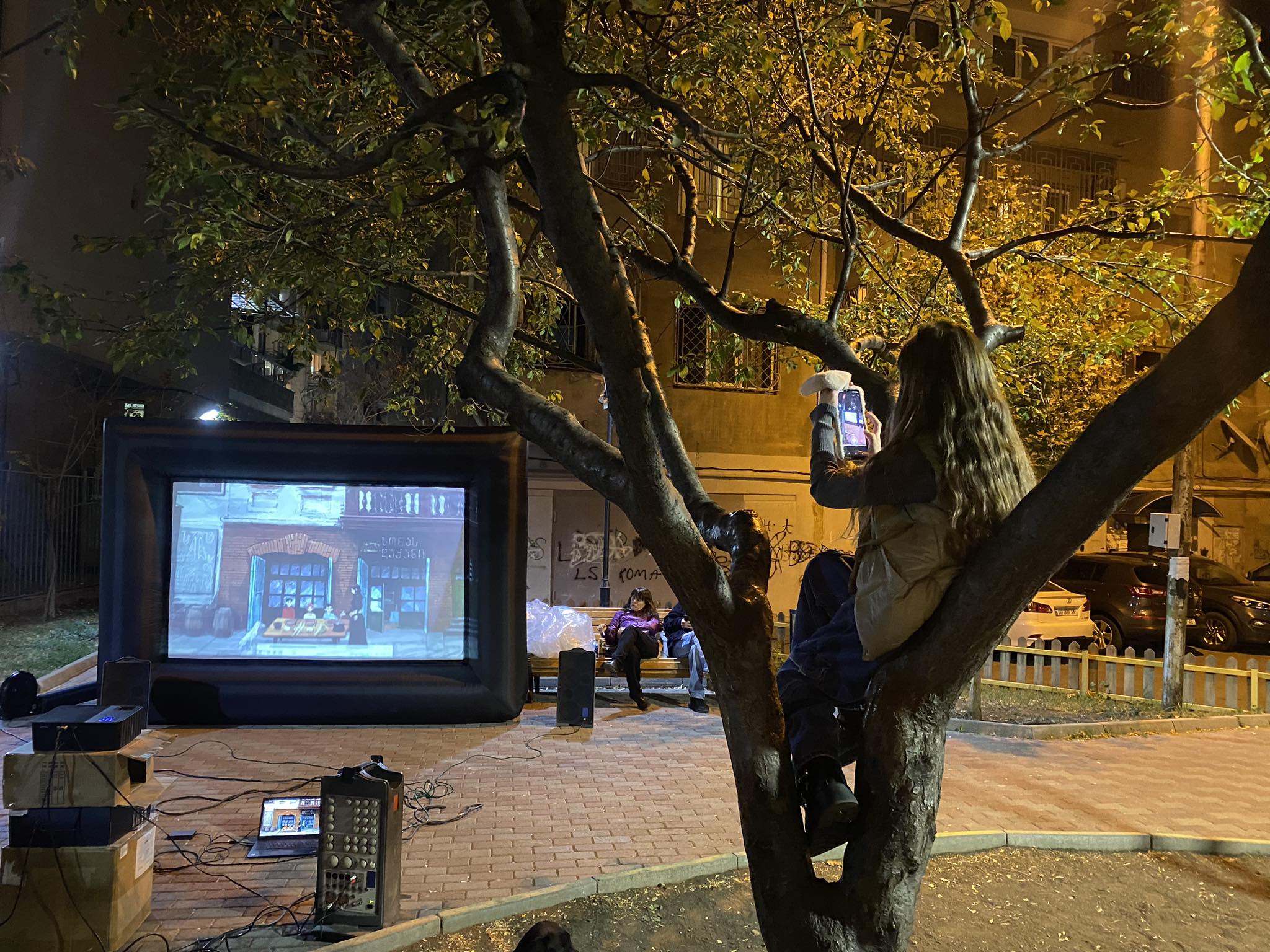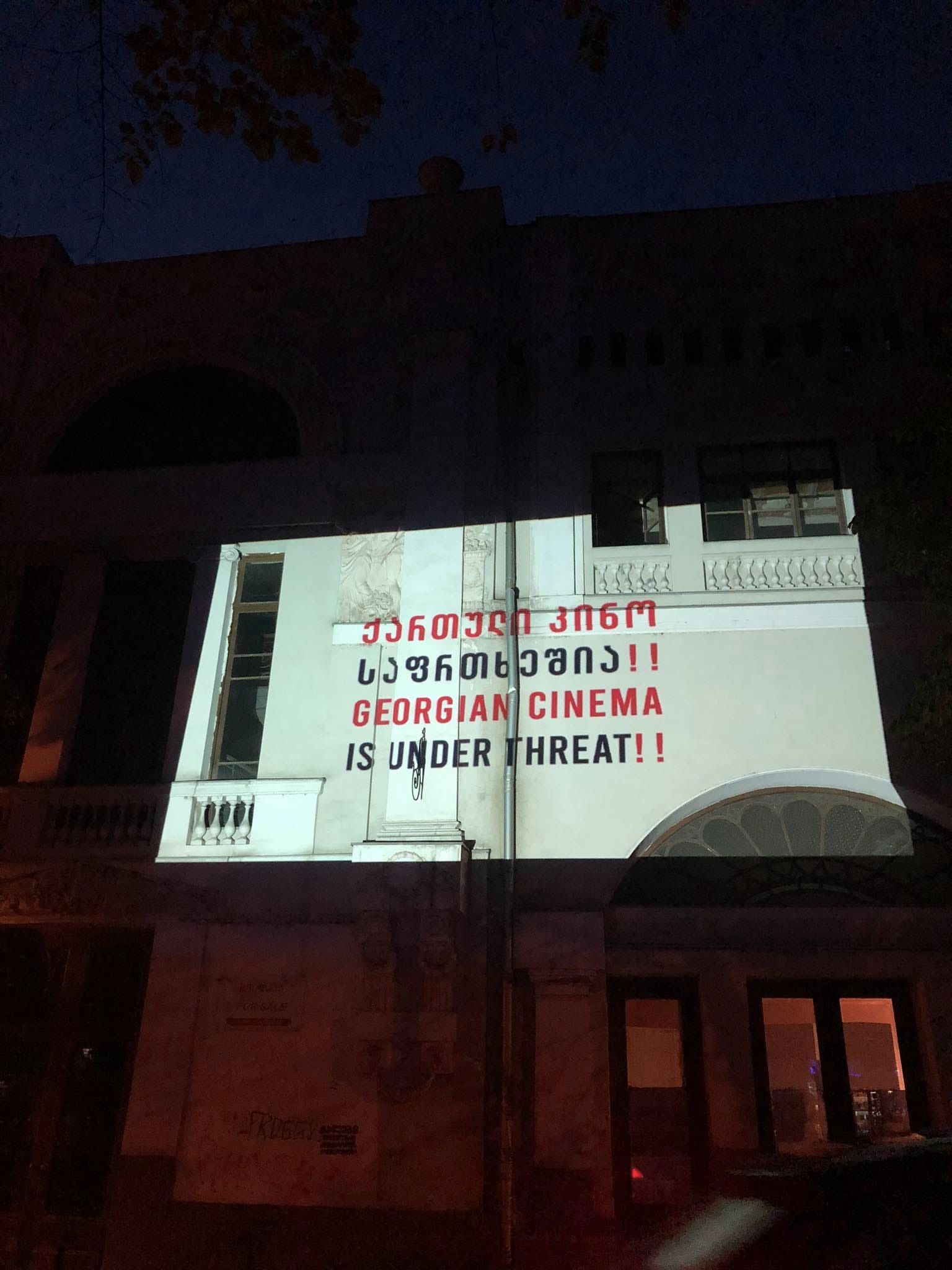Film Screenings under Pressure
HOW TO DEAL WITH POLITICAL AND SOCIAL PRESSURE?
AUTHOR: Mariam Jachvadze, Production Manager (Chai Khana Media, Georgia)
Struggle for democracy
In a time when the struggle for democracy is approaching a turning point, freedom of expression and free speech come under pressure. Furthermore, amid greater invasions of privacy, intimidation and incentives to self-censor both online and offline, freedom of self-expression has also declined over the years, according to the 2023 Freedom in the World report.
Eastern Europe has been no exception. War between Azerbaijan and Armenia, full-scale war in Ukraine, and protests in Georgia made living in the region unstable and insecure. In a fragile democracy, people who create art face challenges on different scales. Political pressure is not the only issue because ultra-nationalist movements and ultra-conservative groups also have a direct influence on some cultural events and the film distribution process.
These groups become stronger when human rights, especially the rights of minorities, are insufficiently protected. In addition, in more traditional societies, the audience tends to be sensitive towards queer topics or gay love. Therefore, films that depict these relationships are not widely welcomed and appreciated. Filmmakers and screening organizers, including the venue managers, must consider all possible complications in countries like Georgia, Azerbaijan, Hungary, or Romania.
In the following chapter, we will give a few examples of how filmmakers and film event organizers deal with the political and social pressure they encounter. Hopefully, it will give you hope that it is possible to screen films even in a challenging context.
HOW TO DEAL WITH POLITICAL AND SOCIAL PRESSURE?

Sensitive Content in Small Towns
Careful selection of films for screening is not a unique experience to Georgia but it extends to other countries, such as Romania, where each film selected for screening is treated with caution. This process becomes more challenging in smaller cities and towns where the audience is limited. Cultural center representatives in these areas invest significant effort to expand the audience and initiate discussions on topics relevant to their society. Their goal is to engage and connect with the audience.
Simion Pop, currently working for the Bistrita Palace of Culture in Romania, acknowledges the existence of sensitive topics and the uncertainty surrounding their potential impact on the audience. In smaller towns, one must strike a delicate balance between attracting more viewers and avoiding alienation.
“There are sensitive topics, and we don’t know how to include them and whether it expands or reduces our audience – it’s a small town, and we don’t want to alienate our audience. We are not New York, where you need not care that much about what you show since there will always be a niche audience. I need to pay attention to people’s sensitive triggers even if they do not coincide with mine.”
Simion
Collaboration with Civic Society
In Croatia, addressing the current social and political issues through documentaries is a very important mission. Local representatives of KineDok actively strive to embrace diverse opinions and encourage critical thinking. Their approach to film screenings involves extensive collaboration with various civic society organizations and experts from different fields, including political science, sociology, philosophy, ecology, anthropology, history, and economy. By doing so, they aim to contextualize the themes covered in certain documentaries in a broader, interdisciplinary manner.

Unpredictable Outcomes in Discussions
Czechia provides another positive example of fostering the exchange of ideas and thoughts among a diverse audience through KineDok. The 2022 KineDok catalog included a film entitled COLORS OF TOBI (2021). The documentary features Eva and her family in a small village in Hungary. Eva’s 16-year-old child recently came out as transgender and now lives under the chosen name of Tobi. Described in the synopsis as an “emotional tale of releasing and accepting,” the film resonates with Ivana from Hrubínka Cultural and Sport Center in Czechia. She notes that the audience’s reaction to Colors of Tobi surprised her.
Georgia has also proved that if you select the screening space with the audience in mind and take the context of your country into consideration, the success of the event can be guaranteed. Even with the risks associated with screening LGBTQI films in Georgia, where active far-right groups pose a potential threat, KineDok Georgia successfully conducted two public screenings of Colors of Tobi without encountering disruptions.
Defying Potential Barriers
This accomplishment was particularly meaningful for Natali Chkhartishvili, a KineDok coordinator in Georgia. Showcasing the film to the public and defying potential barriers represented a significant achievement. The screenings managed to trigger discussions and foster empathy, highlighting the power of thoughtful selection of screening spaces in navigating sensitive topics within a particular cultural context.
“We had the opportunity to have one closed screening for the journalists from the South Caucasus, who were participating in a training session conducted by Chai Khana Media “How to report on queer topics?” and another screening at Untitled Gallery. This was our deliberate choice since this is a venue that frequently organizes events for and with the queer community. That’s why we were confident in expecting no issues and considering it a safe space for the discussion.”
Natali, Chai Khana Media (Georgia)


Memory As a Trigger for Conflict
Many factors can divide people. Memory, too, can serve as a trigger for conflict and resistance, particularly when organizing film screenings that feature historical events. However, it can also be a powerful tool for reflection and dialogue. In Croatia, films addressing Yugoslavia and the former socialist regime remain problematic and require a careful approach to avoid stirring controversy among the population. School students and teachers emerge as the best target audience for this type of documentary.
Dina Pokrajac, a KineDok representative from Zagreb, acknowledges the challenges associated with screening films related to disputed historical events. She notes: “Disputed historical events are still painful in our society, and unfortunately, collective memory is constantly being erased and rewritten. For certain films, we aimed to screen high school students and minors. We encountered challenges in obtaining permission from their parents and school principals, but we managed to convince them. We always strive to provide a broader perspective through well-moderated discussions and trusted experts.”
Films Under Political Pressure
Political pressure is much harder to tackle, especially when it involves an oligarch’s interests or the country’s most influential figures. Salomé Jashi’s latest feature film, Taming the Garden, stands as one of Georgian cinema’s notable successes, winning prizes at international festivals and being nominated at Sundance. However, at home, it has become the country’s most controversial film due to its indirect reference to Bidzina Ivanishvili, the founder of the ruling Georgian Dream party.
In the summer of 2021, Jashi initiated negotiations with Cavea, the sole chain of movie theaters in Georgia, to screen the film for the local audience. After several months of talks, Jashi received an official refusal stating: “We don’t have a practice of releasing documentary films for rent.” This reply seemed unconvincing since Cavea usually takes fiction and documentary films from film productions, puts them on their platform (for subscribers only), and screens them in movie theaters. During the same year, numerous venue managers in various regions of Georgia, including Kvemo Kartli, Ozurgeti, and Batumi, refrained from screening the film to avoid potential conflicts with the local government.
This fear is not unfamiliar to Mindia Esadze, the former director of the Georgian Film Academy in Tbilisi, an independent, non-commercial legal entity aimed at developing and popularizing Georgian cinematography. Taming the Garden was initially approved for screening at the Cinema House seven times. However, the promise was not upheld, leading to the abrupt cancellation of the film’s screenings at the Cinema House in Tbilisi. Jashi recalls the response from the director: “He [Mindia Esadze] told me he would not screen the film that triggered different opinions and divided people on political grounds. Furthermore, he said he did not want to be a victim.”
This development sparked significant interest in society and prompted various organizations to step forward and screen the film. Among them were the Haraki Theatre, Goethe-Institut Georgia, Cafe Ezo, Cafe Mziuri, and others. All the screenings went well.
STRUGGLES WITH CENSORSHIP

The documentary Taming the Garden continued its journey, gaining renewed significance amid ongoing cinematic protests linked to the reorganization of the Georgian National Film Center. In June 2023, Irakli Kobakhidze, the leader of the ruling party, publicly criticized director Salomé Jashi and her film, labeling it as “shameful” and “absurd.” He criticized the Georgian National Film Center for allowing such projects to proceed (e.g., to be funded by the National Film Center), stating, “A film with such shameful content should not be made, instead we should make films with the right content,” in remarks to journalists on June 19, 2023.

The very next day, KineDok Georgia demonstrated resilience and determination by promptly organizing two film screenings of Taming the Garden. Approximately 100 people gathered and actively participated in the discussion that followed the screening. Those unable to attend requested access to the film via a VOD platform.
“We received dozens of messages every day for the whole week. In such a volatile environment, providing VOD access becomes a viable solution to swiftly disseminate the film far and wide.”
Natali Chkhartishvili, KineDok coordinator, Georgia

Censorship and political pressure have spurred film industry professionals and cinema enthusiasts to initiate new movements. Georgian Cinema is Under Threat is a response to opaque decisions made by the Ministry of Culture of Georgia. As part of their protest movement, a new wave of film screenings has been launched under the name Georgian Cinema for the Georgian Audience. This initiative allows citizens to watch and appreciate modern Georgian films in their own backyards all over the country. At a time when municipal movie theaters are absent, films themselves are reaching out to embrace their audience.
7 Tips on Providing Safe Space
Drawing from these diverse experiences, emerging screening coordinators and venue managers can benefit significantly by taking the following into consideration:
1. Understand the unique political, cultural, and social context of your country and society. Tailor your approach to align with the vulnerabilities and preferences of your audience.
2. Foster a friendly and safe atmosphere by inviting guests, speakers, and experts for post-screening discussions. This can enhance the overall experience and provide additional insights for the audience.
3. Allow the audience to discuss and reflect on the topics presented in the films.
4. Consider the language and overall promotion strategy, especially for films that address sensitive topics.
5. Encourage open conversations that promote understanding and bridge gaps, allowing for a more inclusive and enriching experience.
6. Consider alternative screening spaces (or private/invitation-only screenings) where safety is guaranteed.
7. Explore creative ways of protest and supportive initiatives.
PROVIDE SAFE SPACE
DISCUSS
SUPPORT
We live the documentary film, be there with us.
Start each month with a fresh dose of information. Subscribe to the newsletter.
I hereby consent to the processing of the personal data.










